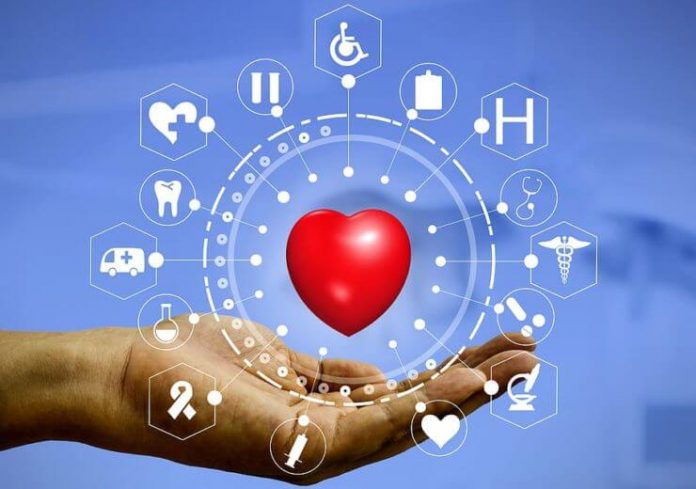This article is written by Yasar Arafath, pursuing a Diploma in Business Laws for In House Counsels from LawSikho.
Artificial intelligence (A.I.) is expected to influence significantly in the medical practice and the delivery of healthcare to the people in the near future. Artificial intelligence in healthcare means utilization of machine-learning algorithms and software to emulate human cognition in the analysis, interpretation, and comprehension of complicated medical and healthcare data. Artificial intelligence (A.I) is the ability of computer algorithms to approximate conclusions based solely on input data.
AI technology is different from traditional technologies in health care as it has the ability to gather data, process it and give a well-defined output to the end-user. Artificial intelligence (A.I.) does this through deep learning and machine learning algorithms. These algorithms framed can recognize patterns in behavior and create their own logic. Artificial intelligence algorithms behave differently with each human. Algorithms used in artificial intelligence can predict with extreme precision, but offer less comprehensible explanation to the logic behind it’s decisions. The primary aim of health related Artificial intelligence applications is to analyze the relationships between prevention techniques or treatment and patient outcome.
Introduction
A.I. has been used extensively earlier in industries such as Information technology, entertainment and transportation during the last decade. A.I has been used to trade on the stock market, control self-driving vehicles; web browsers, social media platforms and search engines. Artificial Intelligence has potentials in the field of medicine, healthcare and drug design and yet, the proof and evidence of practical working are yet to be convincing enough for the public and medical community to adopt the technology.
The use of artificial intelligence in the medical field is still in its infancy stage. There is no doubt that artificial intelligence will play a key role in healthcare and can penetrate the global boundaries of adoption only when medical professionals serve as supportive guides, knowledgeable and leaders in the process. For this, it is important that physicians and doctors understand the technology basics and can see beyond the hype, evaluate A.I.-based studies and clinical validation and as well acknowledge the limitations and opportunities of A.I..
How does Artificial intelligence (A.I.) work
Artificial intelligence (A.I.) works through a method called machine learning. Traditional algorithms are not enough anymore as it is challenging and complicated in writing algorithms for healthcare, a new method was needed. Computers get the ability to learn through machine learning without being explicitly programmed. Good quality of data needs to be fed in the algorithm then machine learning allows to create strategies for excelling at that particular task.
The most efficient way to feed a machine learning algorithm is with symptoms of disease and images of them, preferably with symptoms images of patients that have been annotated manually by human beings to make sure the images do contain disease symptoms. The more such annotated images we feed into the algorithm the better it will become at recognizing disease on symptoms. It will not understand what a disease is, but it will certainly recognize what we think are diseases with symptoms like we do with an increasing efficiency.
We have to feed with simpler machine learning algorithms with data and constantly iterate how it digests it to become better in solving the task. With more complex algorithms like neural networks and deep learning algorithms start creating their own strategies and rules without human input.
When we are applying technologies to make medical decisions, we have to understand the core of the machine or at least the physical and biological explanations behind it. In the case of advanced algorithm based artificial intelligence, it seems we will not able to understand more than the theoretical basics.

Digital health
New health technologies with artificial intelligence (AI) are changing the landscape of the Indian healthcare system. Like many other markets, India too is at the edge of a ‘digital health’ revolution. Digital health technology is a key pillar in delivering value based care across the Indian healthcare continuum. Adaptive intelligent solutions will help to lower the barriers between hospitals and patients, it can improve access to care and enhance overall patient satisfaction, in tier II and III cities in India. New-age technologically driven business strategies are motivating healthcare companies to embrace innovation and emerging trends to successfully capture consumer interest. As the pace of digital innovation in healthcare accelerates creating the opportunities for healthcare companies and manufacturers of medical devices across India who are willing to embrace the digital health space.
Application of artificial intelligence in healthcare system

Artificial Intelligence is getting increasingly sophisticated in doing things more efficiently, more quickly and at a lower cost than what humans do. Both AI and robotics in healthcare have vast potential. Artificial intelligence and robotics are increasingly being part of our healthcare ecosystem.
Save lives: Most of the organisations and medical care centers are relying on Artificial Intelligence to save lives. Cambio HealthCare developed a clinical decision support system for stroke prevention that can give warning to the physician when there’s a risk to a patient of having a heat stroke.
Managing medical records and other Data: In health care system the first step is to compile and analyzing information such as medical records and other past history and data management is the most widely used application of digital automation and artificial intelligence.
Treatment plan: Artificial intelligence systems analyse reports and data from a patient’s file, clinical expertise and external research to help select the correct, individually customized treatment plan.
Virtual nurses: Artificial intelligence has been used to develop a digital nurse to help people in monitor patient’s condition and follow up with treatments, between doctor visits. In 2016, Boston Children’s Hospital developed an app Alexa that provides basic health information and advises parents on children’s ill health.
Medication monitoring: Artificial intelligence helps to monitor medication courses of patients. It is very important in ensuring a proper dose regime to be followed by a patient. The AiCure app monitors the use of medication by a patient.
Drug development: Artificial Intelligence can help pharmaceuticals in developing through clinical trials both faster and cheaper. Program powered by Artificial Intelligence was used in Ebola virus to scan existing medicines that could redefine the fight against disease.
Precision medicine: Information in DNA will help genetics and genomics to find mutation and links to disease. Artificial intelligence can help to detect cancer and vascular disease by body scan and predict the health issues faced by people based on their genetics.
Health Monitoring: Wearable health trackers like those from Apple, FitBit and others monitors heart rate, oxygen levels and activity levels. These apps can send alerts to the user to get more exercise and share this information to doctors for additional information on the needs and habits of patients.
Essential steps to venture into the AI startup arena
- Create a detailed business plan
Having a business idea is one thing, and having a legitimate plan for business is another. Before you start the business and understand the needs of the business and set goals, milestones are needed for preparing a proper business plan. Usually when a business plan is made it should outline the business strategy for the first 3 to 5 years. The business idea should be out of the box as you are venturing into the AI industry.
- Identify the problems you want to solve
Identify the problems that you wanted to solve with the application of the AI or provide demonstrable problems.
- Identify and Understand customers
Identifying the potential customers and understanding their traits will help us to build a product that customers want to purchase. Before you start building an app, it is essential to have a clear picture of your potential customers:
- Who are your customers -Are they businesses or individuals?
- How much money might customers have to spend on the products?
- What do customers think about your competitors’ products?
- Funding
82% of startups fail due to financial problems, a careful evaluation and calculation of money needed for the project has to be conducted. Most of the startups are started from funds raised by self or family or friends, but also think of other ways to raise your startup capital, such as shared ownership, bootstrapping, loans, crowdfunding, microloans, donations, venture capital, angel investors, etc.
- Hire an expert in the field
Every business needs the right people in the right places. Starting with small team with AI expert, dedicated, focusing on straightforward goals or bringing an AI expert to train and help your team
- Set up a pilot project
Before investing a full amount in your startup idea, it’s good to begin with a pilot project and based on the success you can make decisions and make some changes to raise the fund. Pick up a specific problem to solve and then apply the AI with sample data to solve the problem, form the result, collect feedback and design accordingly.
- Data storage as part of your AI plan
Data will act as fuel that can power your AI and machine learning technologies. A successful data storage strategy is essential for the scalability of AI products in the future.
- Test problem-solution fit and continue to improve
Before the product is actually introduced into the market it is important to verify whether it is working correctly by testing your problem-solution fit. If everything seems good, it’s ready to go on and improve your AI startup but if any issues that seem complicated are found, run a few more tests and Make sure everything is under control at this stage.
Regulatory requirements
As a startup progresses from inception to commercialization to scale, one of the most pertinent factors that will shape its operations and strategies is adherence to governmental regulations.
Applicable regulatory legislation and rules will depend upon the state where the startup is established and will operate or where its functional activity will be undertaken.
A health service oriented business have to comply with a series of state-based regulations for different aspects of its business including the:
- Private Medical Establishments Act or Clinical Establishments Act;
- MCI/SMC registration for medical practitioners;
- Regulatory clearances under PCPNDT Act and Atomic Energy Act for any equipment;
- Pharmaceutics drugs license for relevant products;
- License under Drugs and Cosmetics Act, 1940;
- Other Licenses based on the product/services.
In addition to that state-level regulations have to be complied by a startup regarding local government laws.
The novelty of the health care sub-sector and its legal landscape need to be carefully incorporated into a startup’s regulatory strategy. For instance, in sub-sectors like AI/Analytics or Tele-Medicine, there are no explicitly and specifically provided regulatory norms.
Currently, there is no statutory guidance for collecting and using data for Artificial Intelligence based concepts. In practice to protect privacy, data collected can generally be stratified into anonymized vs. non-anonymized data.
In India, the Central Government has recently put up draft DISHA (Digital Information Security in Healthcare Act, 2018) in public domain for comments.
Conclusion
Artificial Intelligence can play a pivotal role in prevention and treatment of diseases with access to intelligent and smart technologies which can enhance productivity and improve healthcare outcomes. Artificial Intelligence promises to change the practice of medicine in many ways but many of its practical applications are still in their infancy stage and which need to be explored and developed better. Medical professionals also need to understand and familiarize themselves with advantages of artificial intelligence technology for better healthcare delivery to the people.
References
- https://blog.forumias.com/answered-discuss-the-potential-application-of-artificial-intelligence-in-the-healthcare-system-also-mention-steps-taken-by-the-government-to-promote-artificial-intelligence-in-india/
- https://www.pwc.com/gx/en/industries/healthcare/publications/ai-robotics-new-health/transforming-healthcare.html
- https://www.franchiseindia.com/wellness/Emergence-of-Artificial-Intelligence-in-Healthcare.10491
- https://www.nature.com/articles/s41746-020-00333-z
- https://www.intechopen.com/books/alginates-recent-uses-of-this-natural-polymer/application-of-artificial-intelligence-in-modern-healthcare-system
- https://healthmanagement.org/c/healthmanagement/issuearticle/ai-and-healthcare-technology-in-india-opportunities-challenges-and-emerging-trends
- https://health.economictimes.indiatimes.com/news/policy/are-you-a-healthcare-startup-looking-to-meet-regulations/64869726
Students of Lawsikho courses regularly produce writing assignments and work on practical exercises as a part of their coursework and develop themselves in real-life practical skill.
LawSikho has created a telegram group for exchanging legal knowledge, referrals and various opportunities. You can click on this link and join:
 Serato DJ Crack 2025Serato DJ PRO Crack
Serato DJ Crack 2025Serato DJ PRO Crack











 Allow notifications
Allow notifications


